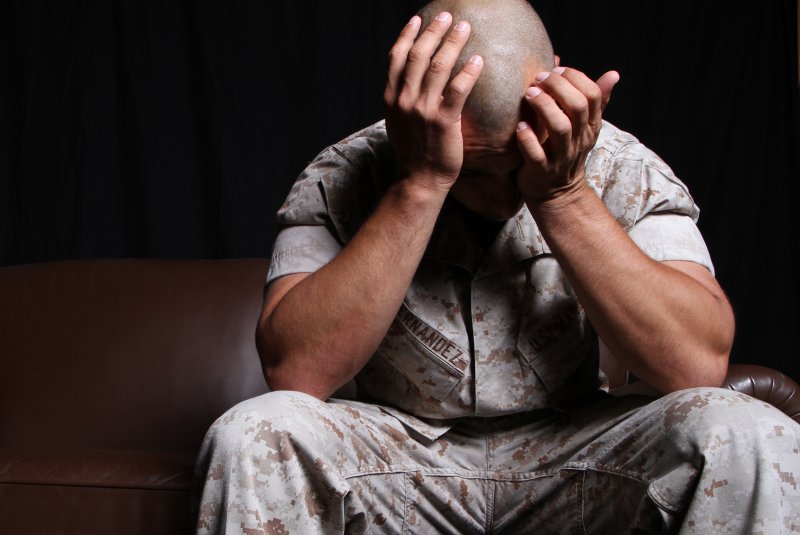Many Marines return home with vivid memories of their combat experiences, and the array of emotions they face internally may be hard to detect. Photo by U.S. Marine Corps/Flickr
Feb. 8 (UPI) -- The drug prazosin failed to effectively alleviate post-traumatic stress disorder in military veterans, according to a trial conducted by researchers with the Department of Veterans Affairs.
Although the drug has been effective in controlling nightmares or improving sleep quality associated with PTSD, the researchers concluded it was no better than a placebo, according to results published in The New England Journal of Medicine. Prazosin, which includes trade names Minipress, Vasoflex, Lentopres and Hypovase, is also used to treat high blood pressure and anxiety.
About 11 percent to 20 percent of veterans of the Iraq and Afghanistan wars have been diagnosed with PTSD, according to the activist group DoSomething.org.
Dr. Murray Raskind, a lead researcher on the trial, told Stat News the trial "seemed like a good idea, but you know, live and learn."
Raskind notes that the trial participants on average had low blood pressure, and that the factor may be linked to the noneffectiveness of the drug, researchers say.
In a separate, smaller 2016 study of 67 soldiers who returned from Iraq and Afghanistan over a 15-week period, Raskind and colleagues found that people with high blood pressure were more likely to respond to prazosin. In that study, approximately one-third of all recipients did respond to the treatment at all.
The newest study was conducted at 13 Department of Veterans Affairs medical centers, where researchers recruited 304 participants who had chronic PTSD and reported frequent nightmares. The researchers then randomly assigned 152 to prazosin and 152 to placebo.
Over 26 weeks, prazosin was administered in escalated doses to a daily maximum of 20 milligrams in men and 12 mg in women.
At 10 and 26 weeks, there were no significant differences between the prazosin group and the placebo group, according to researchers. New or worsening suicidal situations occurred in 8 percent of prazosin users, compared to 15 percent in those assigned to a placebo.
Raskind estimated that 15 percent to 20 percent of veterans in the VA system diagnosed with PTSD are taking prazosin and that the drug still can be effective with some patients.
"I don't think it should change clinical practice -- there are six positive studies and one negative study," Raskind said.
Prazosin is designed to treat PTSD by blocking the alpha1 receptor for norepinephrine, a chemical that boosts the body's arousal in response to stimuli. Military personnel who are combat veterans and survivors of natural disasters, abuse and other trauma often have impulsive behavior, negative feelings and occasionally flashbacks, which serve as triggering stimuli.
"I do hope that this trial doesn't necessarily prevent clinicians from using prazosin as one of the tools in their arsenals," said Anne Germain, director of the Military Sleep Tactics and Resilience Research Team at the University of Pittsburgh School of Medicine, and was not involved with the study, told Stat. "I still think that some people can benefit from it, but we just need to do a much better job of having personalized, predictive treatment algorithms to help people in the end."















